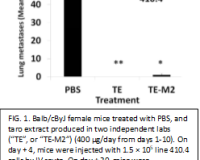Overview
UMB inventors led by Prof. Amy Fulton and Prof. David Weber have developed a novel recombinant protein – a lectin known as “rEMSL1” - and elucidated its structure, binding characteristics, and probable mechanism of action. The rEMSL1 construct has been optimized for expression from mammalian cell lines. In breast cancer and other malignancies, aberrant glycosylation on the surface of tumor cells is associated with higher metastatic potential. The inventors discovered from glycan microarray studies that rEMSL1 binds to glycans shown to be elevated in advanced TNBC and HER-2+ breast cancer (Scott et al., 2019). Treatment of mice with rEMSL1 (i.p. injection) inhibited breast cancer-related metastases to the lung by 69% relative to control-treated mice (manuscript in preparation). In vitro studies demonstrated that rEMSL1 inhibits proliferation of prostate and ovarian cancer cell lines, in addition to direct inhibition of breast cancer stem cells. The anti-metastatic and immune boosting activity of rEMSL1 is linked to its unique glycan-binding properties, as shown by mutation of the carbohydrate recognition sequence (unpublished data). Based on its observed mechanism of action, rEMSL1 is expected to enhance the effectiveness of current breast cancer treatment modalities.
The inventors originally discovered potent anti-metastatic activity from the water-soluble extract of the edible plant, taro, in animal models of breast cancer. This initial discovery (U.S. Patent 8,865,642) led the group to devise rEMSL1, reproducing much of the anti-metastatic activity of the taro extract. Dr. Fulton’s team previously reported that taro extract (TE) inhibited: (a) lung colonization following injection of tumor cells, and (b) spontaneous metastasis from a mammary gland tumor (Kundu et al., 2012). In further experiments, they demonstrated near total suppression of metastasis in immune competent mice treated with TE (see FIG. 1; Kundu et al., 2021).
Photos
Applications
Breast cancer mortality is nearly always a consequence of tumor dissemination (metastatic disease). Relapse is attributed to the emergence of tumor cells with metastatic and/or stem-like properties that are inherently resistant to conventional therapies. While there are many effective therapies to control primary cancers, the identification of effective therapies that specifically target metastasis are urgently needed. Evidence in late-stage clinical trials supports combinations of immunotherapy with standard-of-care chemotherapy for a number of malignant diseases. We predict that rEMSL1 given in the neoadjuvant or adjuvant setting will lead to long-term control of metastasis and will enhance the effectiveness of surgery, chemotherapy and/or immunotherapy, benefiting patient survival.
Stage of Development
The inventors have developed a novel biologic molecule “rEMSL1” that’s been well characterized (i.e., structure; binding; etc.) and engineered for optimal expression from mammalian cell lines, with predictable specific activity. UMB is seeking partnerships to accelerate the further development of rEMSL1 for prevention and treatment of metastatic cancer.
Licensing Potential
Available for licensing & sponsored research
NC 3/4/2024
Contact Info
Office of Technology Transfer
620 W Lexington St., 4th Floor
Baltimore, MD 21201
Email: [email protected]
Phone: (410) 706-2380
